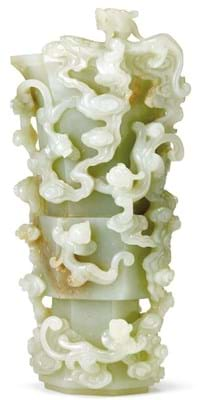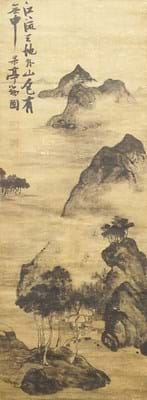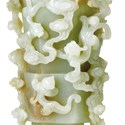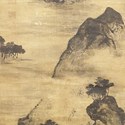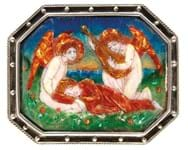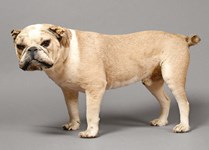The quality and colour of the stone is of increasing importance – and buyers are wary of sophisticated fakes.
A 17th century 10in (25cm) gu-form beaker vase offered by Roseberys London (23% buyer’s premium) on December 5 had a confidence-boosting provenance to a Christie’s Swire sale in 1991 when it was listed as the properly of the TB Walker Foundation in Minneapolis.
Finely worked in a pale celadon stone of even tone with light brown inclusion, the subject matter of nine dragons in meandering clouds includes both an auspicious number and a reference to the nine sons of the dragon king, the mythological dispenser of rain.
Estimated at £4000-6000, but with bids online opening the contest at £30,000, the hammer finally fell at £48,000.
Head of department Bill Forrest selected 340 lots for this sale of Asian art. “With such a broad range of Chinese and Japanese material, it was difficult for me to pick any one stand-out lot. However, the buyers on the day made their minds up fairly quickly, with fantastic results.”
Also singled out for particular attention was a silk hanging scroll decorated with a landscape in the manner of Zhang Ruitu (1570-1644) and inscribed with verses by Tang dynasty poet Wang Wei. Offers started in the region of £2000 but there was a full 10 minutes of bidding before it sold at an even £100,000. It was consigned from a private collection in south Wales that yielded other scroll paintings sold in the range of £5000-10,000.
Yongzheng porcelain
The choice porcelain lots in the sale were three famille rose wine cups from the Yongzheng (1722-35) period. Both sold over the phone to China.
A pair of bowls decorated with anhua dragons and painted depicting lily, peony, orchid, plum blossom, sold at £14,000 (estimate £6000-10,000).
The subject matter would have been suitable for a retiring official, bestowing on him a long, happy and restful retirement from his career at the imperial court. Both the shape of bowls and the underglaze blue six-character Hongzhi marks pay homage to Ming potters.
This lot was followed by a single Yongzheng mark and period conical form bowl painted with a chrysanthemum (representing a life of ease), orchid (for love and beauty) and purple lingzhi fungus (immortality and longevity).
The three together suggests this cup was a gift meant to bestow sentiments of a long and happy marriage on the drinker. It took £10,000.


